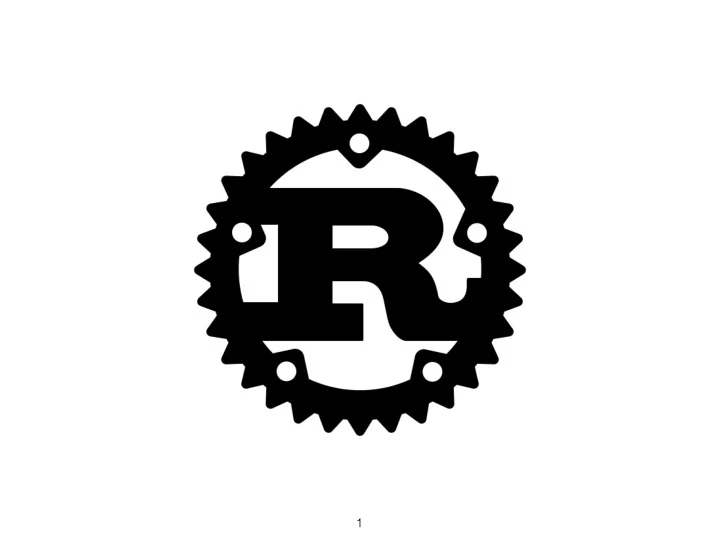

Core Concepts • Ownership • Borrowing • Lifetimes • Traits 56
Traits • Declare abstract interfaces • New traits can be implemented for existing types • Old traits can be implemented for new types • Inspired by Haskell type classes • Enable type level programming 57
trait Show { fn show(&self) -> String; } 58
impl Show for String { fn show(&self) -> String { self.clone() } } 59
impl<A: Show> Show for List<A> { fn show(&self) -> String { match self { &Nil => "Nil".to_string() &List(ref head, ref tail) => format!("{:?} :: {:?}", head, tail.show()) } } } 60
fn print_me<A: Show>(a: A) { println!("{}", a.show()) } 61
#[derive(…)] • Automatically implement common functionality for your types • Let the compiler write the boilerplate for you • Works like Haskell's deriving mechanism 62
#[derive(Debug, PartialEq, Hash, Eq, PartialOrd, Ord)] struct User { name: String, age: i32 } // Debug allows us to use the {:?} formatter // PartialEq allows us to use `==` // Eq is transitive, reflexive and symmetric equality // Hash provides hashing // Ord and PartialOrd provide ordering 63
Marker Traits • Copy • Send • Sized • Sync 64
Copy #[lang="copy"] pub trait Copy : Clone { // Empty. } 65
Clone fn main() { let v = vec![1,2,3]; let v2 = v.clone(); let owned_iter = v2.into_iter(); // v is still valid here } 66
Copy #[derive(Debug, Clone)] struct MyType; // Marker to compiler that type can be copied impl Copy for MyType {} fn main() { let x = MyType; let y = x; // copy occurs here println!("{:?}", x); } 67
Copy #[derive(Debug, Copy, Clone)] struct MyType; fn main() { let x = MyType; let y = x; // copy occurs here println!("{:?}", x); } 68
Send • types that implement Send can be transferred across thread boundaries • implemented by the compiler, a type is Send if all of its components also implement Send 69
pub fn spawn<F, T>(f: F) -> JoinHandle<T> where F: FnOnce() -> T, F: Send + 'static, T: Send + 'static 70
Sized • by default every type is Sized • represents types with statically known size • needed to differentiate between dynamically sized types 71
Sync • A type T is Sync if &T is thread safe • allows for the existence of types that are not thread safe • primary exceptions are: • types with interior mutability • Rc<T> 72
Drop • Allows the running of "clean-up" code • Close a file or socket • Delete a vector's underlying allocation • Deallocate a heap value 73
pub trait Drop { fn drop(&mut self); } 74
pub struct FileDesc { fd: c_int, } impl Drop for FileDesc { … fn drop(&mut self) { let _ = unsafe { libc::close(self.fd) }; } } 75
Slices let v = vec![1,2,3]; println!("{:?}", v[0..]); println!("{:?}", v[1..2]); println!("{:?}", v[..2]); println!("{:?}", v[2]); 76
Some(1).map(|x| x + 1) // => 2 77
Rc<T> • A reference counted smart pointer • Implemented in the standard library • Safe interface around efficient "unsafe" operations 78
Macros • Comes in two flavors: • Compiler plugin (we won't talk about the details of these) • macro_rules! 79
try!(e) // the above call becomes: (match e { Result::Ok(val) => val, Result::Err(err) => { return Result::Err(From::from(err)) } }) 80
FFI • Binding to foreign code is essential • Can't rewrite all the code • Most system libraries are written in C/C++ • Should allow you to encapsulate unsafe code 81
#![feature(libc)] extern crate libc; mod foreign { use libc::{c_char}; extern { pub fn getchar() -> c_char; } } fn getchar() -> char { unsafe { std::char::from_u32(foreign::getchar() as u32).unwrap() } } fn main() { let c = getchar(); println!("{:?}", c); } 82
Tooling 83
Tooling • Tooling is a critical component of when using any programming language • Tooling can drastically impact people's perception of the language; examples: • sbt • make • cabal 84
Testing • Testing is baked into the Rust compiler • Tests can be intermixed with code • Higher level frameworks can be built on the exposed primitives • https://github.com/reem/stainless 85
#[test] fn it_works() { assert!(false); } 86
#[test] #[should_panic] fn it_works() { assert!(false); } 87
#[test] #[should_panic(expected = "assertion failed")] fn it_works() { assert_eq!("Hello", "world"); } 88
describe! stainless { before_each { // Start up a test. let mut stainless = true; } it "makes organizing tests easy" { // Do the test. assert!(stainless); } after_each { // End the test. stainless = false; } bench "something simple" (bencher) { bencher.iter(|| 2 * 2) } describe! nesting { it "makes it simple to categorize tests" { // It even generates submodules! assert_eq!(2, 2); } } } 89
mod stainless { #[test] fn makes_organizing_tests_easy() { let mut stainless = true; assert!(stainless); stainless = false; } #[bench] fn something_simple(bencher: &mut test::Bencher) { bencher.iter(|| 2 * 2) } mod nesting { #[test] fn makes_it_simple_to_categorize_tests() { assert_eq!(2, 2); } } } 90
cargo 91
Cargo.toml [package] name = "tower" version = "0.1.0" authors = ["Jared Roesch <roeschinc@gmail.com>"] 92
Dependencies [dependencies] rustc-serialize = "*" docopt = "*" docopt_macros = "*" toml = "*" csv = "*" threadpool = "*" 93
Dependencies Pin a version [dependencies] rustc-serialize = "0.3.14" docopt = "*" docopt_macros = "*" toml = "*" csv = "~0.14" 0.14.0 <0.15.0 threadpool = "^0" >=0.0.0 <1.0.0 94
Dependencies [dependencies.color] git = "https://github.com/bjz/color-rs" 95
More on cargo • Rust's SemVer: https://github.com/rust-lang/semver • Cargo: https://github.com/rust-lang/cargo • Crates.io: https://crates.io/ 96
rustdoc • Documentation tool • Completely searchable (no Hoogle equivalent yet) • Emits static site with docs for: • Modules • Datatypes • Traits • Impls • etc 97
98
99
100
Recommend
More recommend